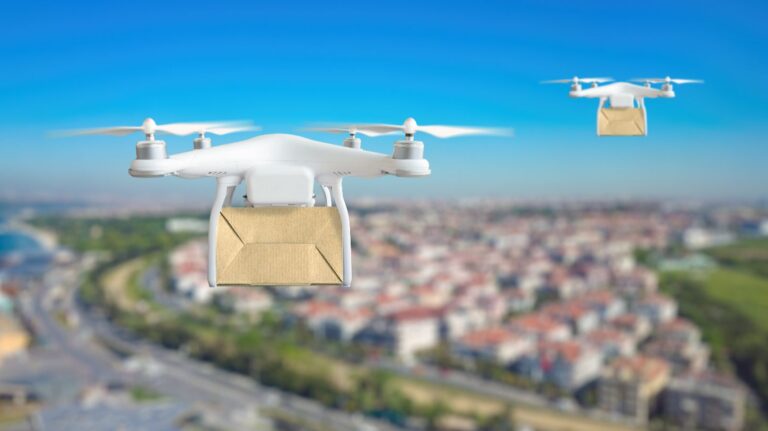Although the concept of drones delivering packages to doorsteps is not a reality for most in the UK, the possibilities for the application of drone technology in logistics operations are boundless.
At this very moment, there are trials underway in the UK and ambitious plans for a future where drones can revolutionise logistics operations, both inside the warehouse and up in the skies.
One organisation that’s heavily involved in shaping the future of drone logistics in the UK is Innovate UK Business Connect. To learn more about what organisations are doing to progress the UK drone logistics sector, Logistics Manager spoke with Andrew Hooley, knowledge transfer manager for aviation at Innovate UK Business Connect. Here’s what he had to say:

What logistical challenges are drones better suited to solving than more traditional solutions?
Drone technology is emerging rapidly and we’re already seeing use in several sectors across the UK.
In the logistics sector, drones will complement traditional modes of transport and support the movement of high-value and time-sensitive goods, particularly in areas where ground transport brings access issues or high cost.
Over time we will see drones carrying larger payloads over much longer distances.
Which specific sectors present the greatest opportunities for the application of drone technology?
Drones will unlock opportunities for all businesses and communities. We see the greatest opportunity in use cases including medical cargo delivery, last-mile delivery, middle-mile logistics, infrastructure inspection and asset surveying as well as emergency fast response.
These use cases will enable all sectors of the economy to take advantage of emerging technologies and enhance they way they operate. We will see significant benefits in the logistics, health, infrastructure, energy and emergency services sectors – with drone operations directly benefiting businesses, customers and communities through operational efficiencies, cost savings and improved access to services.
What is Innovate UK doing to support the future of drone-based logistics?
The UK Research and Innovation (UKRI) Future Flight Challenge was established in 2019 to build the ecosystem needed to accelerate the introduction of new forms of aviation in the UK – including the real world testing and demonstration of drone use for the logistics sector.
Over this time, the £300 million programme has supported the development, growth and adoption of drone technologies and directly involved 225 companies delivering 92 projects across a number of technologies and use cases. The collaborative programme is building a foundation of UK capability, technology and infrastructure to deliver future aviation services at scale.
What is the public perception of drones for logistics, and what education will be necessary if drones become a more common sight in the skies?
As part of the Future Flight Challenge, the University of Birmingham has led a programme of social science research into the public perception of transformative aviation technologies.
The research shows there is public support for the use of drones in the logistics sector with higher perceived benefits in rural and remote areas of the UK. Nearly three-quarters of the UK public perceive the greatest benefits in logistics will come from the delivery of medical supplies, blood samples and tests, with just over half perceiving benefits for delivery of mail, parcels and packages or the commercial movement of goods and materials.
As the use of drones become more common, it is critical we engage with customers and communities to build understanding of the technology and ensure services address public concerns, needs and expectations from the outset. Key to this is ensuring benefits are felt across all communities with services addressing key customer requirements while minimising impacts on wider communities.
What milestones can we expect to see in drone logistics over the next five to 10 years?
Drones are already being used in the logistics industry to streamline asset inspections of warehouses and we’re beginning to see initial operations to support the movement of time-sensitive deliveries in the healthcare sector as well as mail deliveries to remote communities.
The next five to 10 years will see widespread adoption of drones in logistics with greater integration into multi-modal distribution networks across the UK.
Want to learn more about the future of drones in UK logistics? Check out this feature from the August issue of Logistics Manager which looks at trials of drones in action, how firms are overcoming regulatory hurdles, and plans to develop the UK’s very first ‘drone superhighway’!







